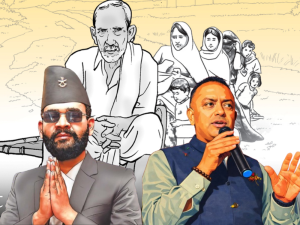Columns
A case of missing Chinese officials
Despite China's anti-graft law, the ongoing rummage exposes an existing loophole in governance.
Hindu Sanskriti Karki
Chinese defence minister Li Shangfu has missed public appearances for over a month. At this critical hour, when China consistently faces pressure from the burgeoning American military ties with Taiwan and other neighbouring countries, the mysterious disappearance of the political and military leader is of concern. Although it is not unusual for leaders of interest to disappear and reappear in China, the absence of the security courtiers surrounding President Xi Jinping is conspicuous. In 2019, General Fang Fenghui, China’s former chief of military staff, and General Zhang Yang, director of the military's political department, both top-ranking officials, disappeared from public view. Come 2023, state councillor Li Shangfu and the ex-foreign minister Qin Gang, high-ranking officials, are missing. The actual cause of this internal strife is still unknown. Whenever a political scandal sprouts, the Chinese leadership provides loose statements, distorting the line between politics and reality, leaving the people perplexed.
Suspicious jailbirds
The Chinese premier’s court has experienced uncanny incidents in the past few months, most of which are associated with the People's Liberation Army (PLA). Among the five service branches of the PLA, the Rocket Force (PLARF), responsible for controlling land-based tactical and strategic missiles and the Strategic Support Force (PLASSF), responsible for supervising the space, cyber, political and electronic warfare, came under the radar of the commander-in-chief of the Central Military Commission (CMC). It started with the prosecution of the ex-deputy of the PLARF, Zhang Zhenzhong and current deputy, Liu Guangbin, and extended to the head of the PLARF. The absence of the PLARF commander Liu Yuchao and the political commissar Xu Zhongbo from the promotion ceremony of the rocket force and the appointment of the deputy commander of navy Wang Houbin and air force officer Xu Xisheng in their respective positions confirmed the elimination of the PLARF officials.
Likewise, the senior commander of the PLASSF, General Ju Qiansheng, also missed the 96th anniversary of the founding of the PLA in July. General Li went missing the following month after delivering a speech at the third annual China-Africa Peace and Security Forum in Beijing. Known to the trusted confidant of President Xi, General Li, an aerospace engineer with experience in the satellite and rocket launch division, has made a significant contribution to modernising the technical aspects of the Chinese military. Shortly after, Cheng Dongfang, who served as the PLA's military procuratorate before being appointed the President of the PLA’s military court in 2022, was deposed by the Standing Committee of the National People’s Congress. The arbitrary decision of cross-branch appointments and dismissal in the PLA hint at extreme disappointment among the top echelons in China. The challenge remains in identifying the authentic source of this disappointment under Beijing's opaque governance.
Apart from the military reshuffle, the Ministry of Foreign Affairs also witnessed a change in leadership after serving for the shortest period in the history of China. Qin Gang was assigned the role of foreign minister in January 2023 with the expectation that he, who previously served as the country’s ambassador to America, could help mend the Sino-US ties. Unfortunately, the spy balloon mishap, the pressing sanctions on technology transfer, and the Taiwan bait further divided Washington and Beijing, revealing that Qin's effort did little to strengthen China’s bargaining position against the US. Could this setback justify his departure in June, or has there been some disciplinary misconduct?
Guilty to a felony
Similarly, the anticipated official visits and meetings of General Li were either postponed or cancelled. Against this background, the CPC spokesperson cited health concerns when responding to the query regarding his whereabouts. On the contrary, a report by Reuters said Li, along with the six military officials under the commander-in-chief, was under investigation for embezzlement of military equipment. Before serving as a defence minister, Li was the CMC's Equipment Development Department’s (EDD) head between 2017-2022. Technically, he was responsible for overseeing the equipment purchase across the five branches of the PLA. The Chinese government regards the PLARF as the crucial unit to deter the American threat against Taiwan. Packed with missile forces, including short-, medium- and intermediate-range missiles, the establishment of PLARF came with a bulk investment to strengthen China's nuclear deterrence capacity. The influx of cash, perhaps, was the opportunity created.
Despite China's anti-corruption law, the ongoing rummage shows that the loophole in governance still exists. In July, the CPC announced a probe into corruption in the equipment procurement process dating back to 2017. A keen observation of the current purge signals the abnormality in hardware procurement and dissemination of information concerning projects and army units during Li’s tenure as the head of the EDD. With the department under investigation, the probability of the convicted military official's linkage to this tragedy is high. This pattern indicates that such misconduct still dominates the highest ranks of the PLA.
The crackdown on corruption is a hallmark event for President Xi, who had vowed to make no exceptions and grant leniency to the ‘tigers’ and ‘flies’— powerful leaders and inferior bureaucrats. If the felony charges are proven, it provides a classic opportunity for President Xi to cleanse and strengthen his grasp over the military institution by eliminating the infiltrators and avoiding the Trojan Horse tragedy. Second, it would help refurbish the credibility of the leadership, which became doubtful after the economic plunge triggered by the pandemic and the Sino-US trade war. Nevertheless, can it guarantee a complete root out of the corruption in the system?
Reasonable doubt
The much-hyped concept of loyalty-driven leadership in China appears flawed and unsustainable. Deception by the cohorts personally endorsed by President Xi attracts political disarray within the Communist Party. Besides, the rumours about the investigation challenge China's dream of modernising its military and building a world-class armed force by 2050. National defense modernisation consists of developing and procuring new weapons and equipment, maintaining a high level of realistic combat-oriented exercises of the troops and improving the welfare of military personnel. Within this vision, if the PLA wishes to reform its nuclear retaliatory capabilities to deliver credible threats during warfare, it cannot afford any error within the PLA, precisely, the PLARF.
As the Sino-US relationship becomes increasingly volatile, the discipline and command of the unit cannot be compromised. So the rampant crackdown of the military and civil officials makes sense. It helps reassure the country that the communist party dictates the gun, and therefore, the military should always remain loyal to the party.




 10.95°C Kathmandu
10.95°C Kathmandu

.jpg&w=200&height=120)













